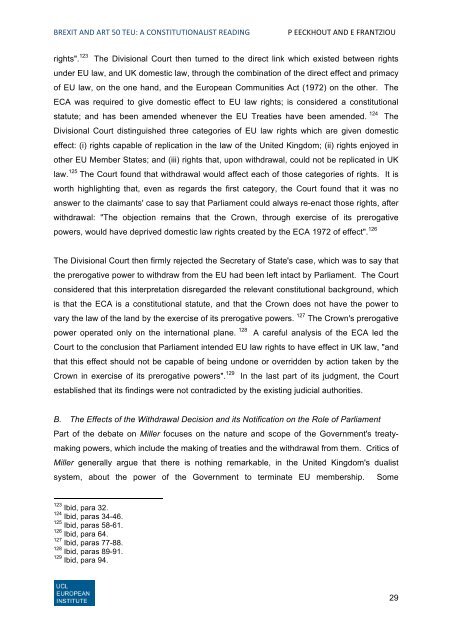brexit-article-50
brexit-article-50
brexit-article-50
Create successful ePaper yourself
Turn your PDF publications into a flip-book with our unique Google optimized e-Paper software.
BREXIT'AND'ART'<strong>50</strong>'TEU:'A'CONSTITUTIONALIST'READING''''''''''''''''''''P'EECKHOUT'AND'E'FRANTZIOU'<br />
rights". 123 The Divisional Court then turned to the direct link which existed between rights<br />
under EU law, and UK domestic law, through the combination of the direct effect and primacy<br />
of EU law, on the one hand, and the European Communities Act (1972) on the other. The<br />
ECA was required to give domestic effect to EU law rights; is considered a constitutional<br />
statute; and has been amended whenever the EU Treaties have been amended. 124 The<br />
Divisional Court distinguished three categories of EU law rights which are given domestic<br />
effect: (i) rights capable of replication in the law of the United Kingdom; (ii) rights enjoyed in<br />
other EU Member States; and (iii) rights that, upon withdrawal, could not be replicated in UK<br />
law. 125 The Court found that withdrawal would affect each of those categories of rights. It is<br />
worth highlighting that, even as regards the first category, the Court found that it was no<br />
answer to the claimants' case to say that Parliament could always re-enact those rights, after<br />
withdrawal: "The objection remains that the Crown, through exercise of its prerogative<br />
powers, would have deprived domestic law rights created by the ECA 1972 of effect". 126<br />
The Divisional Court then firmly rejected the Secretary of State's case, which was to say that<br />
the prerogative power to withdraw from the EU had been left intact by Parliament. The Court<br />
considered that this interpretation disregarded the relevant constitutional background, which<br />
is that the ECA is a constitutional statute, and that the Crown does not have the power to<br />
vary the law of the land by the exercise of its prerogative powers. 127 The Crown's prerogative<br />
power operated only on the international plane. 128 A careful analysis of the ECA led the<br />
Court to the conclusion that Parliament intended EU law rights to have effect in UK law, "and<br />
that this effect should not be capable of being undone or overridden by action taken by the<br />
Crown in exercise of its prerogative powers". 129 In the last part of its judgment, the Court<br />
established that its findings were not contradicted by the existing judicial authorities.<br />
B. The Effects of the Withdrawal Decision and its Notification on the Role of Parliament<br />
Part of the debate on Miller focuses on the nature and scope of the Government's treatymaking<br />
powers, which include the making of treaties and the withdrawal from them. Critics of<br />
Miller generally argue that there is nothing remarkable, in the United Kingdom's dualist<br />
system, about the power of the Government to terminate EU membership. Some<br />
123 Ibid, para 32.<br />
124 Ibid, paras 34-46.<br />
125 Ibid, paras 58-61.<br />
126 Ibid, para 64.<br />
127 Ibid, paras 77-88.<br />
128 Ibid, paras 89-91.<br />
129 Ibid, para 94.<br />
29


